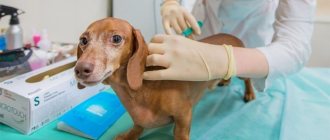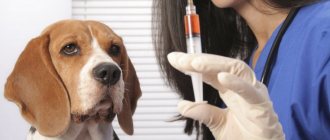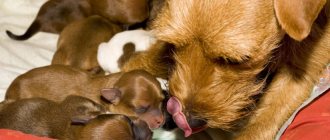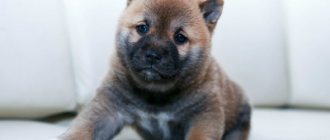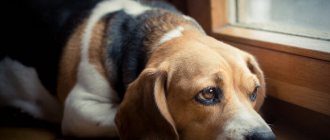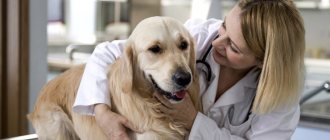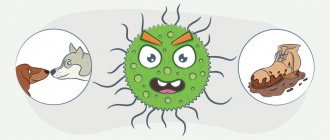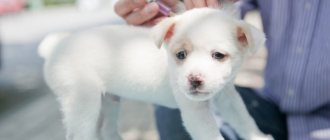Until a certain age, puppies go to the toilet indoors and are not taken out for walks. The owners teach their pet to use the litter box, but the baby may get lost in playing and not even notice that he has made a puddle right on the floor. It is only logical that the happy owner of an adorable dog is looking forward to the day when his pet goes outside for the first time. In this regard, questions arise: is it possible to walk a dog after the first preventive vaccination or do you need to endure quarantine?
Complications in a dog or puppy after vaccination - what to do?
Vaccination is a process in which weakened strains of certain pathogens of dangerous diseases are introduced into the body: rabies, canine distemper, coronavirus infection, enteritis. The body learns to distinguish and fight them. This is how acquired immunity is formed. Of course, this is quite difficult and severe; the body endures serious stress, which can cause complications. By raising the temperature, the body fights pathogens, this is how it reacts and learns to fight. The immune system acquires skills and methods of fight, it hardens and becomes a more experienced defender.
Important! Instructions for use of all vaccines without exception (regardless of price and quality) warn of the possibility of an allergic reaction and anaphylactic shock!
There is always some risk, but control measures are also known.
Lump on the withers
Refers to non-critical complications. The injection itself may cause it or a skin reaction to the contents of the syringe (solution with strains) may begin. The manufacturer allows for this possibility and a small tumor. It is worth constantly monitoring this area; if it increases or changes color, contact your veterinarian. The tubercle itself can resolve up to a month from the moment of formation.
Important! Squeezing, pinning, processing or burning the lump at the injection site is prohibited!
The dog is lethargic
Lethargy may occur as a result of the body's response to immunization. Just as the immune system kills pathogens, the body needs to cleanse itself of this toxin. There is an additional load and not everyone has the strength to remain within the physiological norm. The temperature can rise to 39C and last for 2-3 days. It's not critical.
Important! If the temperature rises and remains above 39 degrees, immediately seek help from the clinic!
The dog has diarrhea
After vaccination, a dog often has diarrhea. It is allowed once, as the body’s ability to cleanse itself of negative substances, just like vomiting. This is a defensive reaction. If repeated, you should seek the help of specialists.
If your dog has diarrhea after vaccination, the temperature will rise. This reaction is typical for weakened puppies. Healthy individuals tolerate vaccination without diarrhea.
Important! Not to be confused with poisoning - with poisoning, the temperature drops!
Puppy whines
The whining itself is a consequence of the sensations endured by the puppy from the vaccination. The needle injection site itself may hurt. It may itch, ache, and even burn a lump at the injection site. A sharp rise in temperature is familiar to everyone, but for a puppy this is the first time. Vaccination can also cause nausea, headaches, and joint pain. The animal can whine for up to 3 days. It is important to monitor it and the temperature.
Attention! At 39.5, consult a doctor immediately.
The dog is limping
This may be the case if the vaccine was injected intramuscularly into the thigh. The place itself hurts, or the body reacts, a lump appears, which, for example, aches. The animal may limp or even have trouble walking. Very high temperatures sometimes cause little puppies to have problems walking.
Important! We constantly monitor the temperature. Everything should go away in 3 days.
Dog doesn't eat
Refusal to eat occurs due to fever, nausea, vomiting and diarrhea (toxins of dead vaccine strains), and the pain of the vaccine itself. It should go away within the day the procedure is done.
Attention! If you refuse food for more than one day, consult a doctor.
Indications for vaccine administration
There is no cure for rabies. The disease is provoked by a neurotropic virus, which, once in the nervous system, quickly affects brain cells.
Dogs are most often susceptible to this disease. Not only strays, but also pets are at risk.
While walking, your four-legged friend may be bitten by another dog carrying the virus. The infection is also transmitted through contact with cats.
Pets that are taken hunting can get the virus from wolves, foxes, and wild birds.
The danger of rabies is that the incubation period lasts at least 40 days without obvious signs of infection. When clinical changes begin, it is no longer possible to correct anything.
During this period, the sick animal spreads the infection to its immediate environment, first through saliva, then begins to bite. If there are other pets in the house (cats, birds, hamsters, etc.), they become potential victims of infection.
Already in the first days after infection, the animal is able to “share” the virus with its owners by licking their hands or face. The slightest crack or abrasion on the body is enough to get rabies.
Importance of grafting
The vaccine allows you to protect your pet by making it resistant to the virus. Even if a dog is bitten by a sick animal, the immunity that appears after the vaccination kicks in.
By protecting a pet in this way, the owner protects his family and surrounding people from serious danger.
Vaccination against rabies in dogs is not only regulated by law. A person bears some responsibility for failure to comply. When deviating from vaccination, owners face the following problems:
unvaccinated animals cannot be walked in crowded places and transported on public transport;- they should not be taken hunting, fishing, dacha, nature - the risk of infection is too great;
- Without a vaccination mark, a dog will not be allowed to participate in exhibitions and will not be allowed to travel abroad with it.
If a pet bites someone, the owner must present the dog's passport, which must contain a vaccination stamp. Otherwise, the animal is isolated for 10 days to monitor its behavior, and the owner is fined.
When to take your dog outside after vaccination - duration of quarantine
If a healthy adult dog has been vaccinated and not for the first time, then quarantine can be observed by conditionally protecting it from contact with other dogs for one week. When vaccinated against rabies, two.
When immunizing a puppy, the quarantine lasts two weeks with complete isolation, take it outside only in your arms, do not put it on the ground, and do not have contact with animals.
Attention! Don't bathe the dog! Protect your home from shoes, entrance mats, etc.
After the second vaccination, the puppy is recommended to walk without restrictions, also 2 weeks after the procedure. When vaccinating against rabies, follow the same measures, but 3 weeks.
Preparing the puppy for vaccination
Only a completely healthy animal should be vaccinated, and the veterinarian will definitely check this. If the puppy is already sick, then vaccination will not help, it will only worsen his condition. This is not a cure, it is the virus itself, only weakened.
To avoid the negative consequences of vaccination, follow these rules:
- A week before vaccination, start measuring the animal’s temperature every day and examining its mucous membranes.
- After vaccination, you cannot walk for at least two weeks! The first walks should be made only in a clean area, without other animals.
- Contact with other animals only 21 days after vaccination.
- If the vaccination is in the morning, then do not feed the animal in the evening; if in the evening, then the last meal is 4 hours before. Vaccination is easier to tolerate on an empty stomach. You can give him something to drink.
Even if all the rules are followed, the animal will feel worse after vaccination. The vaccination itself is stressful, and the virus will begin to awaken the immune system. You shouldn’t worry too much, but you need to give the puppy more attention and care during rehabilitation.
Is it possible, how and for how long to walk with a puppy without vaccinations?
Every breeder will say categorically no. Is it possible to walk a puppy without vaccinations, relying on maternal immunity? No, it is active up to 8 weeks. This is a very young age for walking.
Within the city limits
This is especially dangerous, since in densely populated areas there are a lot of domestic and stray animals, vaccinated and not. The risk is great.
In the country
We have to be careful. In rural areas, most domestic dogs have never been vaccinated, or the procedure was carried out once. It’s safer to get vaccinated and quarantine and walk around calmly with good immunity.
Is contact with other puppies allowed?
With strangers prohibited. Contact is allowed with puppies of the same litter and they should be vaccinated at the same time!
Duration of quarantine
Vaccination of animals against rabies is regulated by law. Not only the schedule for administering the vaccine has been established, but also the quarantine period after the procedure.
The veterinary legislation (section “Measures for the prevention of rabies”) specifies the uniform quarantine period for the Russian Federation - 1 month.
Instructions that come with vaccines may indicate shorter durations. These recommendations can be followed if the dog will not be taken anywhere or sold.
When can you take your dog out into the world? If the pet participates in exhibitions and other competitions, the vaccination stamp in the passport should not be expired.
An unvaccinated dog is vaccinated no later than a month before the event with a mandatory quarantine of 30 days.
How to avoid complications after vaccination - useful tips
To do this, you should remember and do the following:
- The pet must be clinically healthy and must be dewormed (wormed). Puppies 21 days before and again after 10 days, older dogs – 10 days before vaccination.
- It is important to strictly follow the vaccination schedule according to the manufacturer's instructions.
- Use a drug with a normal expiration date, proper storage (the vaccine is destroyed in heat), without visible changes - the composition must correspond in appearance to the instructions. Follow the recommendations for administering the dose into the body, the rules of septic tanks, and asepsis.
- Strictly follow the quarantine instructions, do not change the diet and general environment familiar to the puppy. Do not bathe the dog and carefully monitor its condition. Take your temperature at least 3 times a day. Do not give treats that can cause allergies. Make sure there is fresh water. If a lump appears at the injection site, do not treat it, but let it dissolve on its own. If the temperature rises above 39, contact your veterinarian.
- It is recommended to repeat vaccinations for puppies with vaccines from the same manufacturer, for adults - depending on availability.
- When vaccinating yourself, you should only buy vaccinations with a certificate and from the appropriate pharmacy.
Which vaccine is best to vaccinate a dog?
Today there are many polyvaccines, both imported and domestically produced. All vaccines have undergone clinical trials and are not particularly different from each other. The use of any of them promotes the development of immunity. But if you are going to travel abroad with your dog, then the requirements of, for example, the European Union for the non-commercial movement of pets limit the list of vaccines used.
If you plan to travel around the world with your dog, then imported polyvalent vaccines such as Nobivak, Eurican, Duramun are recommended.
You can read in more detail about preparing your four-legged dog for vaccination and about the vaccination schedule from birth.
So, you have properly prepared the animal for the procedure and vaccinated it. I have already written that after vaccination the animal’s immunity is very weakened, so the risk of contracting a viral disease is very high. Therefore, after vaccination, quarantine should be strictly observed.

